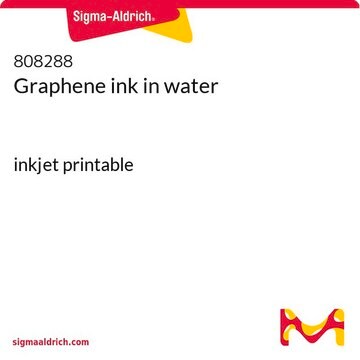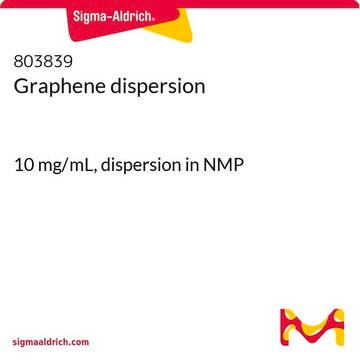900960
Graphene dispersion
for spin/spray-coating, photonic annealing
Synonym(s):
Conductive ink, Graphene ink
About This Item
Recommended Products
product name
Graphene ink for spin/spray coating photonically annealable, for spin-coating, spray-coating, photonic annealing
Quality Level
form
dispersion (black)
greener alternative product characteristics
Design for Energy Efficiency
Learn more about the Principles of Green Chemistry.
sustainability
Greener Alternative Product
concentration
1.8-3.0 wt. % solids
resistivity
0.003-0.005 Ω-cm, sample prepared by spin-coating at 2000 rpm/30 s for 5 coats, followed by thermal annealing at 300 °C in air for 30 minutes
particle size
≤3 μm
viscosity
2-8 mPa.s(25 °C) (1000 s-1)
bp
78 °C (ethanol)
density
0.78-0.88 g/mL at 25 °C
greener alternative category
, Enabling
General description
Application
Spin-coating a single layer at 2000-5000 rpm yields a final film thickness of 40-60 nm. To achieve thicker films, multiple layers can be applied without a baking step. This is recommended over using a lower spin speed to maintain film uniformity. This ink should work on almost any substrate.
Electrical performance:
Following a baking step at 300 °C for 30 minutes in air, the spin-coated films exhibit sheet resistance of 300-800 Ω/sq, corresponding to a resistivity of 0.003-0.004 Ω−cm. With 5 coats at 2000 rpm, a 200 nm thick film with a sheet resistance of 160 Ω/sq. is obtained.
General guidelines:
Ethanol is recommended for cleaning up the ink and dried films, as well as dilution. Bath sonication (5-10 minutes) of the ink prior to use is recommended following extended periods of disuse.
Signal Word
Danger
Hazard Statements
Precautionary Statements
Hazard Classifications
Eye Dam. 1 - Flam. Liq. 2 - Skin Irrit. 2
Storage Class Code
3 - Flammable liquids
WGK
WGK 1
Flash Point(F)
54.5 °F - closed cup
Flash Point(C)
12.5 °C - closed cup
Certificates of Analysis (COA)
Search for Certificates of Analysis (COA) by entering the products Lot/Batch Number. Lot and Batch Numbers can be found on a product’s label following the words ‘Lot’ or ‘Batch’.
Already Own This Product?
Find documentation for the products that you have recently purchased in the Document Library.
Customers Also Viewed
Our team of scientists has experience in all areas of research including Life Science, Material Science, Chemical Synthesis, Chromatography, Analytical and many others.
Contact Technical Service












